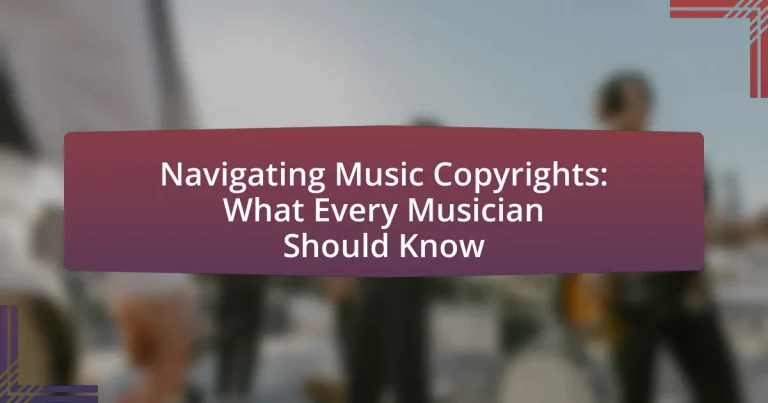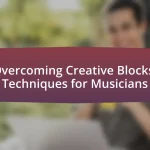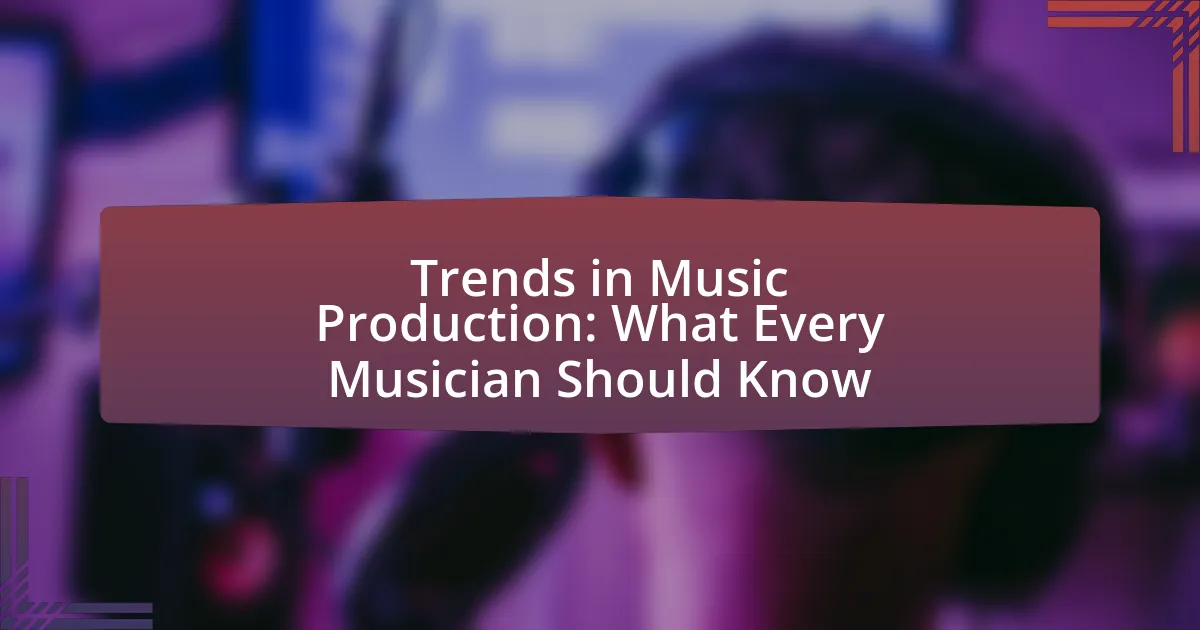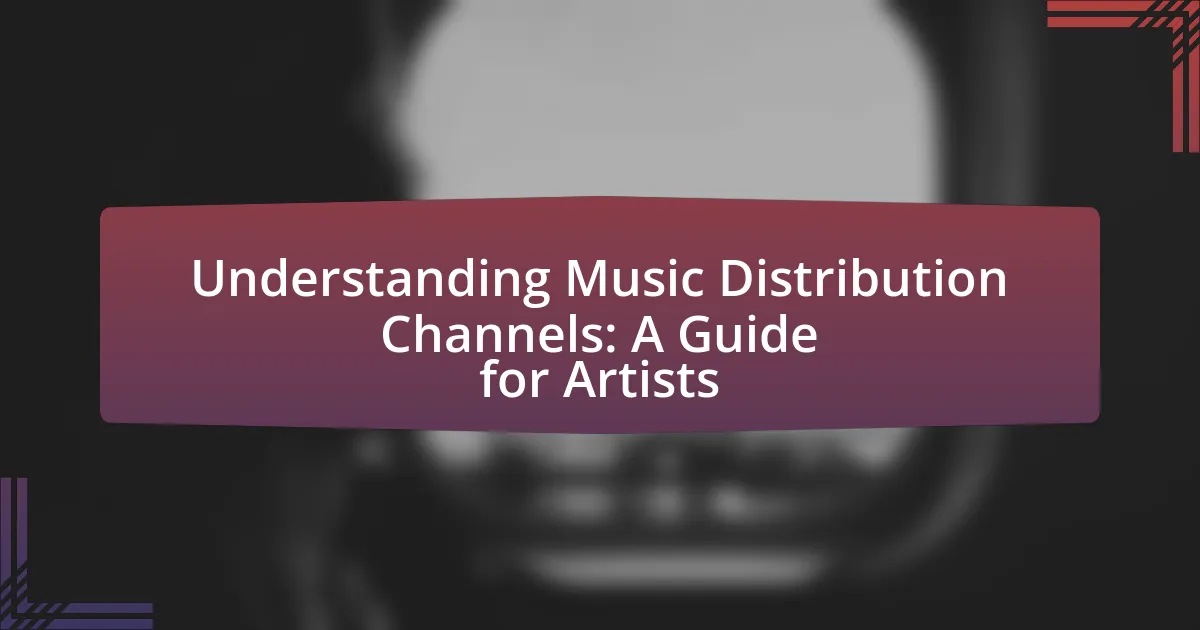Music copyrights are legal protections that grant creators exclusive rights to their original musical works, including compositions and recordings. This article provides a comprehensive overview of music copyright, detailing how it protects musicians’ rights, the types of works covered, and the implications of copyright infringement. It also explains the different types of music copyrights, such as mechanical, performance, and synchronization rights, and outlines the registration process and its benefits. Additionally, the article addresses common misconceptions about copyright, offers strategies for musicians to protect their work, and highlights resources available for navigating copyright issues in the music industry.
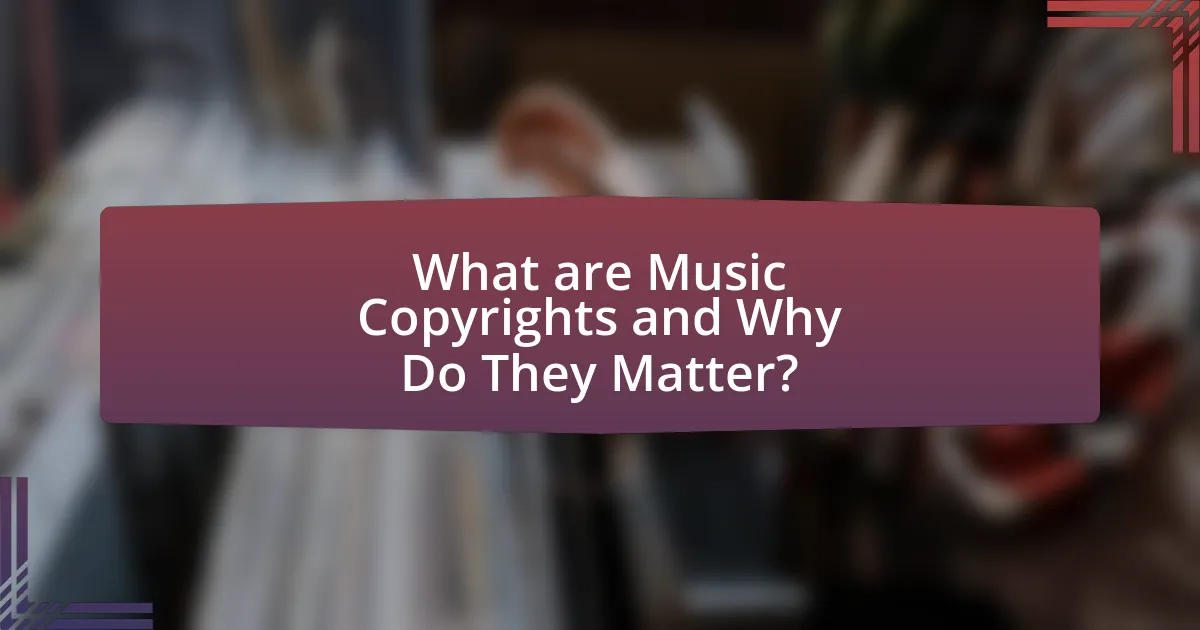
What are Music Copyrights and Why Do They Matter?
Music copyrights are legal protections granted to creators of original musical works, including compositions and recordings, which give them exclusive rights to use, distribute, and profit from their creations. These rights matter because they ensure that musicians and songwriters can control how their music is used, preventing unauthorized reproduction or distribution, and allowing them to receive compensation for their work. According to the U.S. Copyright Office, copyright protection is automatic upon the creation of a work, and it plays a crucial role in the music industry by fostering creativity and innovation while providing a framework for licensing and royalties.
How do music copyrights protect musicians’ rights?
Music copyrights protect musicians’ rights by granting them exclusive control over the use and distribution of their original works. This legal framework allows musicians to prevent unauthorized reproduction, distribution, and public performance of their music, ensuring they receive recognition and financial compensation for their creative efforts. Copyright law, established under the U.S. Copyright Act of 1976, provides musicians with the ability to license their works, thereby generating income through royalties. Additionally, copyright registration offers legal advantages, such as the ability to sue for infringement and eligibility for statutory damages, reinforcing the protection of musicians’ rights in the competitive music industry.
What types of works are covered under music copyright?
Music copyright covers various types of works, including musical compositions, sound recordings, and lyrics. Musical compositions refer to the written music and melody, while sound recordings encompass the actual audio performance of the music. Lyrics are the textual component of a song, which is also protected under copyright law. These categories are defined under the U.S. Copyright Act, which grants exclusive rights to creators for their original works, ensuring they can control reproduction, distribution, and public performance.
How does copyright infringement occur in the music industry?
Copyright infringement in the music industry occurs when an individual or entity uses a copyrighted musical work without permission from the copyright holder. This can happen through unauthorized reproduction, distribution, performance, or adaptation of the music. For example, if a song is sampled in a new track without obtaining the necessary licenses, it constitutes infringement. According to the U.S. Copyright Office, music is protected under copyright law, which grants exclusive rights to the creator, and violations can lead to legal consequences, including monetary damages and injunctions.
What are the different types of music copyrights?
The different types of music copyrights include mechanical rights, performance rights, synchronization rights, and reproduction rights. Mechanical rights allow the reproduction of a musical work in physical formats, such as CDs or vinyl, and are typically managed by organizations like the Harry Fox Agency. Performance rights grant permission for a song to be performed publicly, which is often overseen by performance rights organizations like ASCAP or BMI. Synchronization rights are required when music is used in audiovisual works, such as films or commercials, and involve licensing agreements between the music owner and the producer. Reproduction rights pertain to the ability to reproduce a work in various formats, including digital downloads and streaming services. Each type of copyright serves to protect the interests of creators and ensure they receive compensation for their work.
What is the difference between mechanical rights and performance rights?
Mechanical rights refer to the rights to reproduce and distribute a musical composition in physical or digital formats, such as CDs or downloads. In contrast, performance rights pertain to the right to publicly perform a musical work, whether live or through media like radio and television. Mechanical rights are typically managed through licensing agreements with record labels or music publishers, while performance rights are often administered by performance rights organizations that collect royalties on behalf of songwriters and publishers. This distinction is crucial for musicians to understand in order to navigate the complexities of music copyrights effectively.
How do synchronization rights work in music copyright?
Synchronization rights in music copyright allow the holder to license the use of a musical composition in conjunction with visual media, such as films, television shows, or advertisements. These rights are essential for creators who wish to pair their music with visual content, as they ensure that the composer or copyright owner is compensated for the use of their work. The licensing process typically involves negotiating terms and fees between the rights holder and the party seeking to use the music, which can vary based on factors like the project’s budget and the intended use of the music.
What are the key components of music copyright law?
The key components of music copyright law include the protection of original works, the rights of creators, and the duration of copyright. Music copyright law safeguards the rights of composers, lyricists, and performers by granting them exclusive rights to reproduce, distribute, and publicly perform their works. This legal framework ensures that creators can control how their music is used and receive compensation for its use. Copyright duration typically lasts for the life of the creator plus an additional 70 years, as established by the Copyright Act of 1976 in the United States. This duration allows for a significant period during which the creator or their heirs can benefit from the work.
What is the duration of music copyrights?
The duration of music copyrights is typically the life of the author plus 70 years. This means that for works created after January 1, 1978, the copyright lasts for the lifetime of the creator and extends for an additional 70 years after their death. For works created before this date, the duration can vary, but generally, it is 95 years from publication or 120 years from creation, whichever is shorter. This framework is established under the Copyright Act of 1976 in the United States, which has been amended to reflect these durations.
How can musicians register their copyrights?
Musicians can register their copyrights by submitting an application to the U.S. Copyright Office. This process involves filling out the appropriate forms, paying a registration fee, and providing a copy of the work to be registered. The U.S. Copyright Office, established in 1870, provides legal protection for original works of authorship, including music, ensuring that musicians can enforce their rights against unauthorized use.
How can musicians navigate the complexities of music copyrights?
Musicians can navigate the complexities of music copyrights by understanding the different types of rights involved, such as reproduction, distribution, and performance rights. Familiarity with copyright law enables musicians to protect their original works and avoid infringement. For instance, registering their music with a copyright office provides legal proof of ownership, which is crucial in disputes. Additionally, utilizing services like performance rights organizations (PROs) helps musicians collect royalties for public performances. According to the U.S. Copyright Office, copyright registration not only establishes a public record of the work but also allows for statutory damages and attorney fees in case of infringement.
What are common misconceptions about music copyrights?
Common misconceptions about music copyrights include the belief that simply recording a song grants automatic copyright protection, which is incorrect; copyright protection is established upon the creation of an original work, but formal registration with the U.S. Copyright Office provides additional legal benefits. Another misconception is that using a short clip of a song is always permissible under fair use; however, fair use is context-dependent and not guaranteed, especially in commercial contexts. Additionally, many assume that copyright lasts indefinitely, while in reality, copyright duration typically lasts for the life of the author plus 70 years, after which the work enters the public domain.
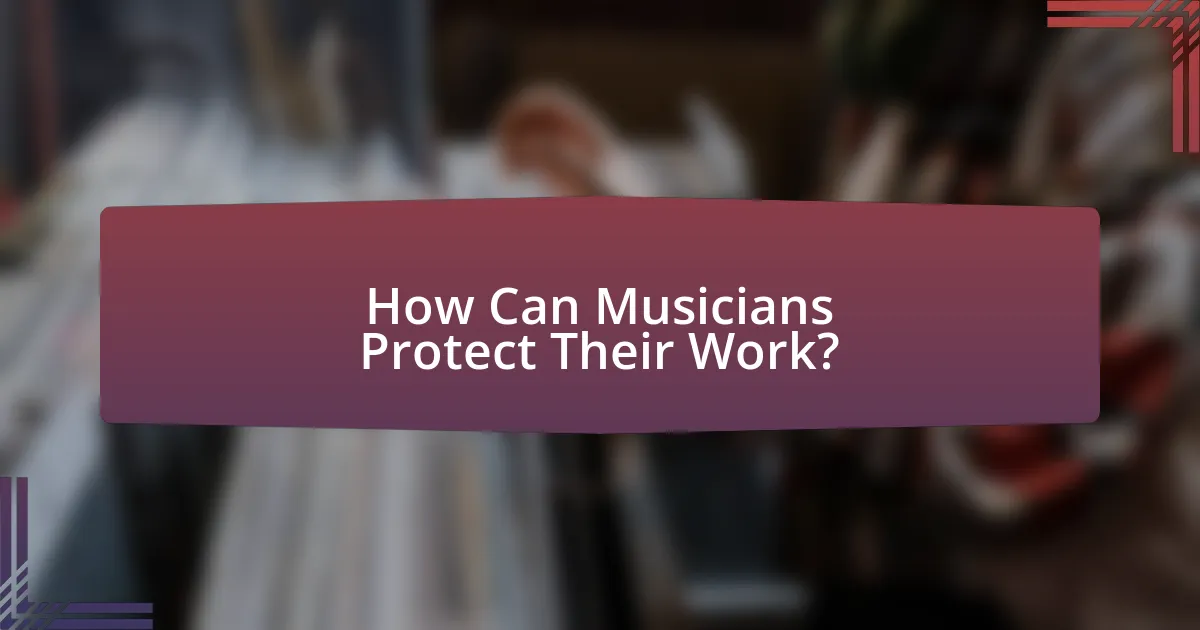
How Can Musicians Protect Their Work?
Musicians can protect their work by registering their music with copyright offices and utilizing performance rights organizations. Copyright registration provides legal recognition and the ability to enforce rights against unauthorized use, while performance rights organizations, such as ASCAP or BMI, help musicians collect royalties for public performances. According to the U.S. Copyright Office, registration is essential for pursuing legal action against infringement, as it establishes a public record of ownership. Additionally, musicians should consider using contracts for collaborations and licensing agreements to further safeguard their rights and clarify ownership.
What steps should musicians take to secure their copyrights?
Musicians should register their works with the U.S. Copyright Office to secure their copyrights. This formal registration provides legal evidence of ownership and is necessary for filing lawsuits against infringers. Additionally, musicians should maintain detailed records of their creative process, including drafts and recordings, to establish the timeline of creation. They should also consider using copyright notices on their works, which inform the public of their rights and can deter infringement. Furthermore, musicians can explore licensing agreements to control how their music is used by others, ensuring they retain rights while allowing for potential revenue.
How can musicians effectively document their work?
Musicians can effectively document their work by maintaining detailed records of their creative process, including drafts, recordings, and notes. This documentation serves as evidence of authorship and can be crucial in copyright disputes. For instance, keeping timestamps on digital files and using registered copyright services can provide legal protection and establish a clear timeline of creation. Additionally, utilizing platforms like SoundCloud or Bandcamp to publish work can further solidify ownership, as these platforms often include metadata that tracks the original creator.
What role do copyright notices play in protection?
Copyright notices serve as a formal declaration of ownership and provide legal protection for creative works. By including a copyright notice, creators signal to the public that the work is protected under copyright law, which can deter unauthorized use and infringement. The presence of a copyright notice also establishes a presumption of validity in legal disputes, as it demonstrates that the creator has taken steps to assert their rights. According to the U.S. Copyright Office, a copyright notice typically includes the symbol ©, the year of first publication, and the name of the copyright owner, which collectively inform others of the copyright status and help in enforcing those rights if necessary.
What are the benefits of copyright registration for musicians?
Copyright registration provides musicians with legal protection for their original works, ensuring exclusive rights to reproduce, distribute, and perform their music. This registration serves as a public record of ownership, which can deter infringement and strengthen the musician’s position in legal disputes. Additionally, registered works are eligible for statutory damages and attorney’s fees in case of infringement, which can significantly enhance the financial recovery for the musician. According to the U.S. Copyright Office, registration is a prerequisite for filing a lawsuit for infringement, thereby reinforcing the importance of this process for legal recourse.
How does registration enhance legal protection?
Registration enhances legal protection by providing official documentation of ownership, which serves as evidence in legal disputes. When a musician registers their work with a copyright office, it establishes a public record that can deter infringement and strengthen the musician’s position in court. For instance, registered works are eligible for statutory damages and attorney’s fees in infringement cases, which are not available for unregistered works. This legal framework underscores the importance of registration in safeguarding a musician’s rights and interests.
What financial benefits can arise from copyright registration?
Copyright registration provides financial benefits such as the ability to enforce rights in court, which can lead to monetary damages and attorney fees if infringement occurs. Registered copyright holders can also license their works, generating revenue through royalties. Additionally, registration can enhance the market value of a work, making it more attractive to potential buyers or investors. According to the U.S. Copyright Office, registered works are eligible for statutory damages and attorney’s fees in litigation, which can significantly increase the financial recovery in cases of infringement.
How can musicians enforce their copyright rights?
Musicians can enforce their copyright rights by registering their works with the U.S. Copyright Office, which provides legal documentation of ownership and the ability to pursue legal action against infringers. Registration allows musicians to file lawsuits for statutory damages and attorney fees, enhancing their ability to protect their intellectual property. Additionally, musicians can monitor the use of their music through digital platforms and employ services that track unauthorized usage, enabling them to take action against copyright violations effectively.
What actions can be taken against copyright infringement?
Actions that can be taken against copyright infringement include sending a cease-and-desist letter, filing a Digital Millennium Copyright Act (DMCA) takedown notice, pursuing legal action through a lawsuit, and seeking statutory damages. A cease-and-desist letter formally requests the infringer to stop using the copyrighted material, while a DMCA takedown notice can be submitted to online platforms to remove infringing content. Legal action can result in court-ordered injunctions and financial compensation for damages. Statutory damages can be awarded even if actual damages are not proven, with amounts ranging from $750 to $30,000 per work infringed, or up to $150,000 for willful infringement, as established by the U.S. Copyright Act.
How can legal counsel assist in copyright disputes?
Legal counsel can assist in copyright disputes by providing expert legal advice, representation, and negotiation strategies tailored to the specific circumstances of the case. They help clients understand their rights under copyright law, evaluate the strength of their claims or defenses, and navigate the complexities of legal proceedings. For instance, legal counsel can draft cease-and-desist letters, file lawsuits, or respond to infringement claims, ensuring that all actions comply with relevant laws and regulations. Their expertise is crucial in assessing damages, negotiating settlements, and potentially avoiding lengthy litigation, which can be costly and time-consuming for musicians and copyright holders.
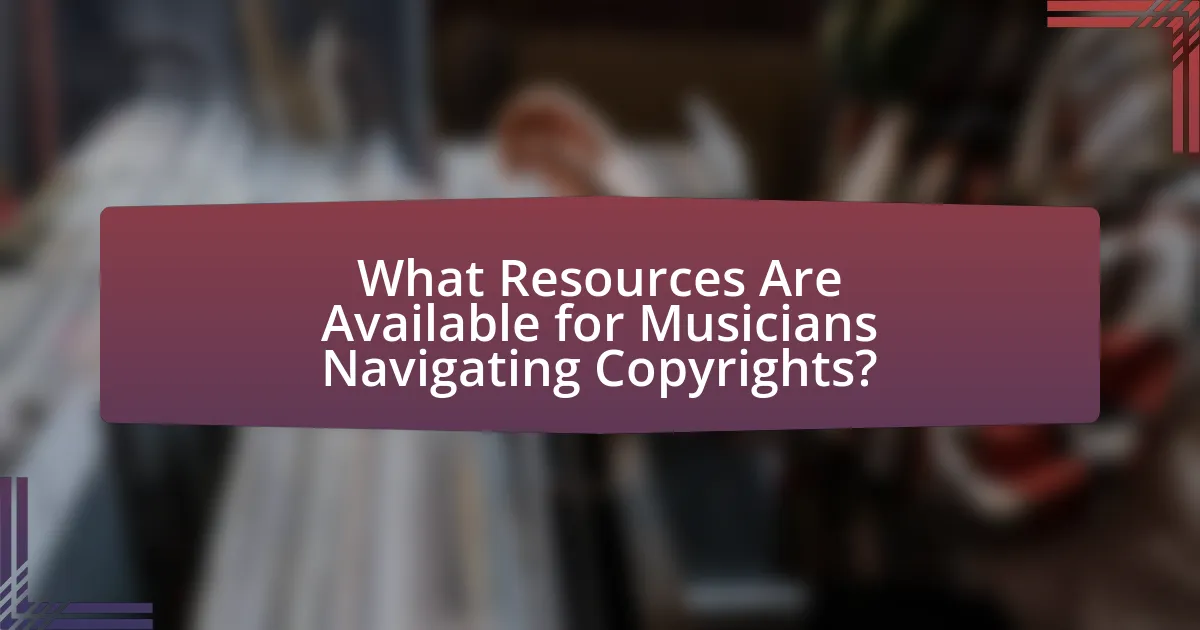
What Resources Are Available for Musicians Navigating Copyrights?
Musicians navigating copyrights can access several key resources, including the U.S. Copyright Office, which provides comprehensive information on copyright registration and protection. Additionally, organizations like ASCAP, BMI, and SESAC offer guidance on performance rights and royalties. Legal aid clinics and online platforms such as LegalZoom provide affordable legal advice tailored to musicians. Furthermore, educational resources from music industry associations, such as the Music Publishers Association, offer insights into copyright laws and best practices. These resources collectively empower musicians to understand and manage their copyright issues effectively.
What organizations support musicians with copyright issues?
Organizations that support musicians with copyright issues include the American Society of Composers, Authors and Publishers (ASCAP), Broadcast Music, Inc. (BMI), and the Recording Industry Association of America (RIAA). ASCAP and BMI are performance rights organizations that help musicians protect their rights and collect royalties for public performances of their music. The RIAA advocates for the interests of the recording industry, including copyright protection for artists. These organizations provide resources, legal support, and advocacy to ensure musicians can navigate copyright challenges effectively.
How can performance rights organizations assist musicians?
Performance rights organizations (PROs) assist musicians by collecting and distributing royalties for public performances of their music. PROs monitor various platforms, such as radio, television, and live venues, to ensure that musicians receive compensation whenever their work is played. For instance, in the United States, organizations like ASCAP and BMI have reported distributing millions of dollars in royalties annually, ensuring that songwriters and composers are fairly compensated for their creative efforts. This systematic collection and distribution process allows musicians to focus on their artistry while ensuring their rights are protected and their income is secured.
What online resources provide guidance on music copyright?
The U.S. Copyright Office website provides comprehensive guidance on music copyright, including registration processes and legal protections. This resource outlines the rights of music creators, the importance of copyright registration, and offers access to relevant forms and publications. Additionally, organizations like the American Society of Composers, Authors, and Publishers (ASCAP) and the Broadcast Music, Inc. (BMI) provide educational materials and resources on copyright issues specific to music. These organizations help musicians understand licensing, royalties, and the implications of copyright infringement.
What are best practices for musicians regarding music copyrights?
Musicians should register their works with a copyright office to protect their music legally. This registration provides a public record of ownership and is essential for enforcing rights in case of infringement. Additionally, musicians should use clear licensing agreements when collaborating with others or distributing their music, ensuring that all parties understand their rights and obligations. Keeping detailed records of all compositions, including dates and versions, further strengthens a musician’s claim to ownership. According to the U.S. Copyright Office, registering a copyright not only establishes a legal claim but also allows for statutory damages and attorney fees in case of infringement, reinforcing the importance of these practices.
How can musicians stay informed about copyright changes?
Musicians can stay informed about copyright changes by regularly following updates from reputable sources such as the U.S. Copyright Office, music industry organizations like ASCAP and BMI, and legal blogs focused on copyright law. These organizations provide newsletters, webinars, and resources that outline recent changes and developments in copyright legislation. For instance, the U.S. Copyright Office frequently publishes updates on legislative changes and policy adjustments that affect copyright law, ensuring that musicians have access to the latest information.
What strategies can musicians use to avoid copyright disputes?
Musicians can avoid copyright disputes by ensuring they obtain proper licenses for any samples or covers they use in their music. This includes securing mechanical licenses for cover songs and obtaining synchronization licenses for music used in videos. Additionally, musicians should keep detailed records of their original compositions and any collaborations, as this documentation can serve as evidence of ownership in case of disputes. Furthermore, utilizing copyright registration with the U.S. Copyright Office provides legal protection and can strengthen a musician’s position in potential disputes. According to the U.S. Copyright Office, registered works are eligible for statutory damages and attorney’s fees in infringement cases, reinforcing the importance of registration.
